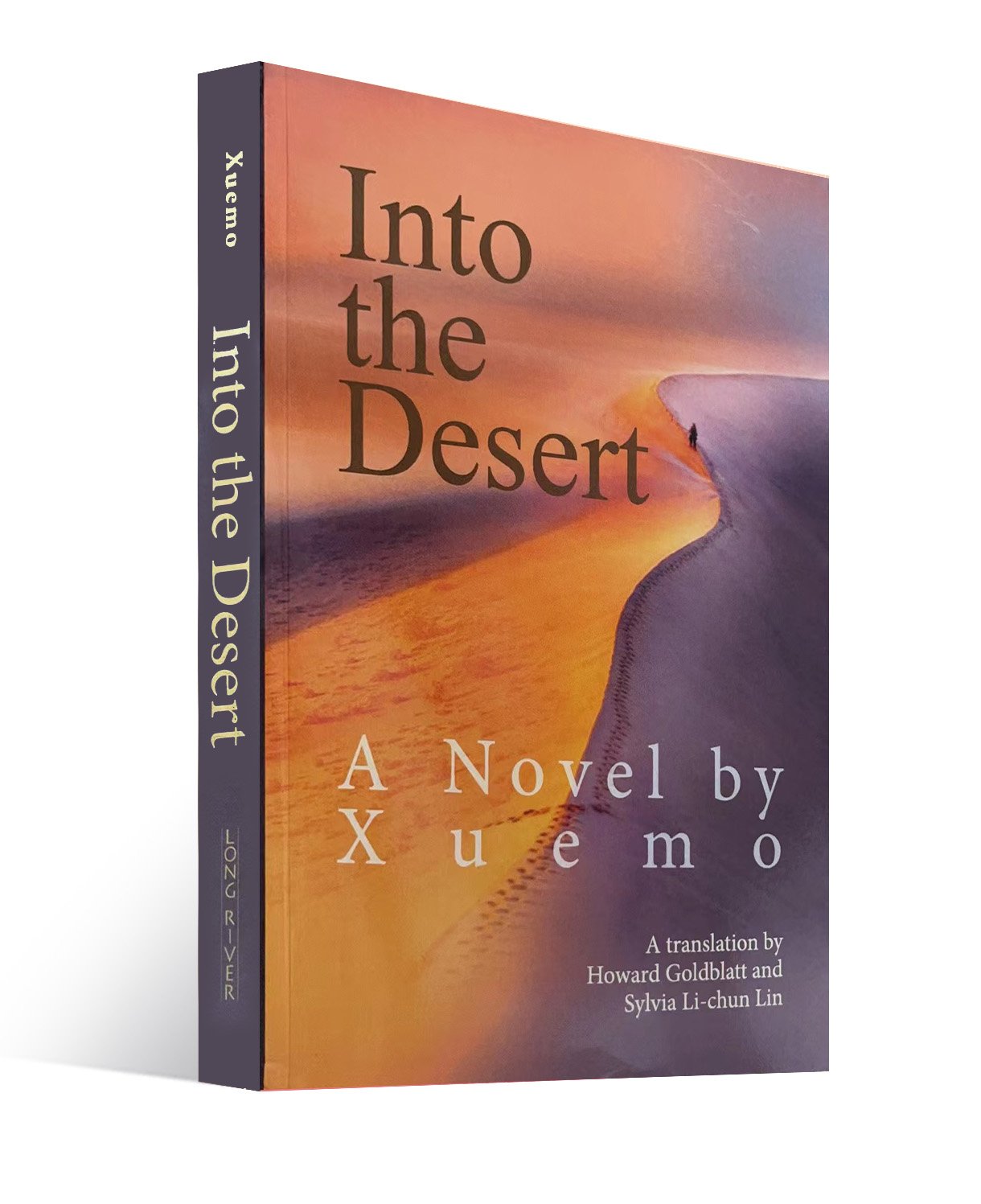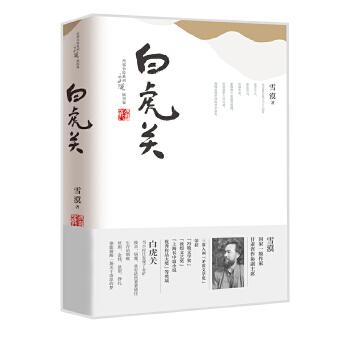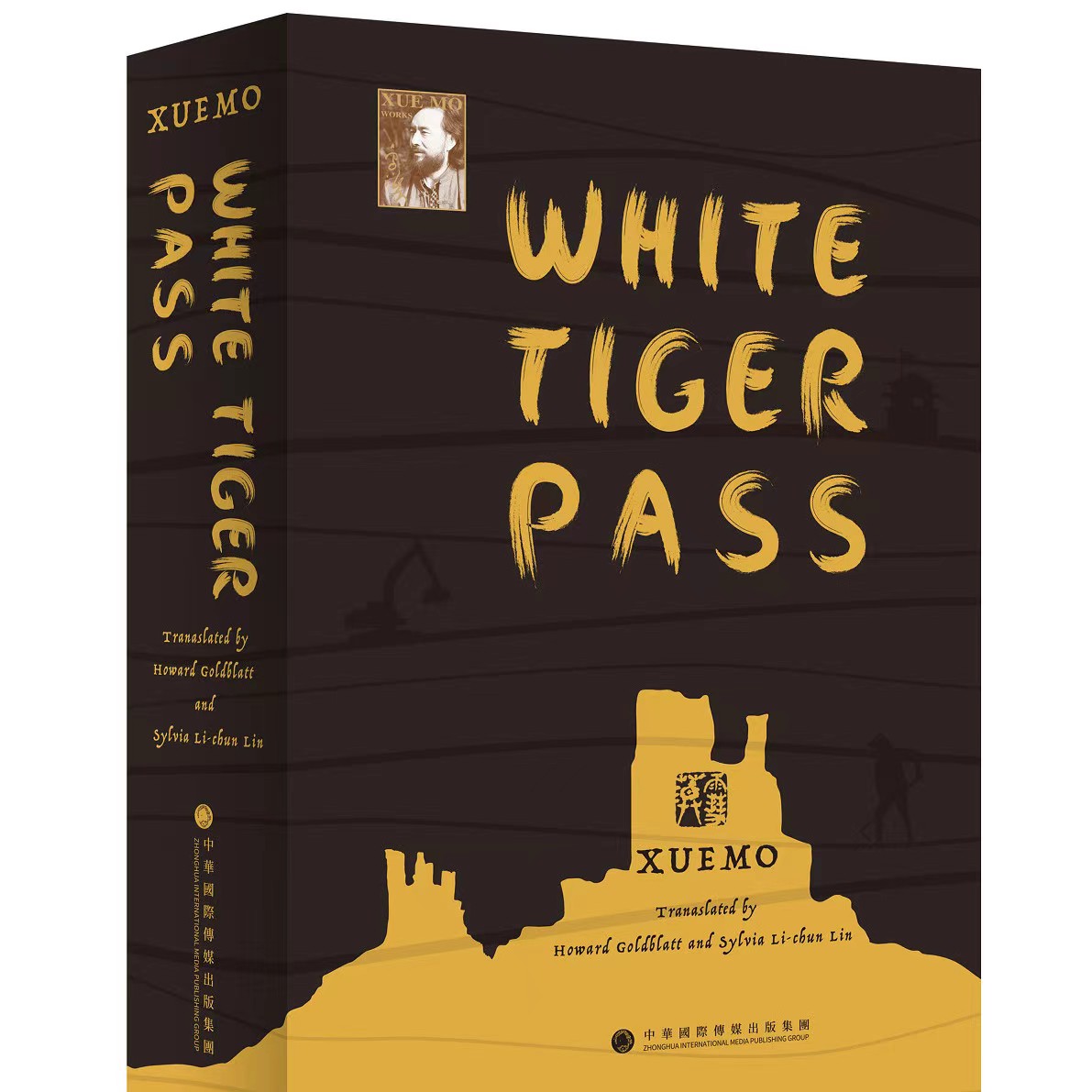
Into the Desert
Review by James Kennedy
《走进沙漠》评论
(美)作家:James Kennedy
In mid-1990s rural China, two sisters-in-law set upon a dangerous journey in Xuemo's compelling novel Into the Desert (Long River Press). There aren't many choices beyond marriage for pious, practical Lanlan and sweetly idealistic Ying'er in their poor village on the edge of the Gobi Desert. In an economic exchange arranged by their mothers, the two women are paired off with one another's brothers, but this turns out to be a raw deal for both brides. In defiance of custom, feisty Lanlan walks out on her marriage to Ying'er's older brother Bai Fu—an abusive lout who abandoned their young daughter to die in the desert, superstitiously believing this would eventually cause Lanlan to bear him a son in her place. Ying'er, in turn, is married to Lanlan's hapless brother Hantou, who promptly dies of liver cancer—but not before callous city doctors drain the family of their savings. Lanlan's breach of the families' exchange marriage agreement means that either Ying'er must be forced to marry again, or they must find another wife for Bai Fu. The two sisters-in-law hit upon a third option: journey across the desert to the salt lakes, and bring back a load of valuable salt to buy Ying'er's freedom.
由长河出版社出版,作家雪漠的力作《走进沙漠》刻画了上个世纪90年代中期,兰兰、莹儿姑嫂二人踏上的一段危险之旅。在她们位于戈壁边境的贫困村庄内,虔诚务实的兰兰和甜美、富于理想主义色彩的莹儿除了婚姻之外并没有太多的选择。在她俩母亲的安排下,出于经济利益的考虑,这两位女子分别以换亲的形式与各自的兄弟结婚,但这场婚姻对两个新娘来说都不公平。后来,好强的兰兰不顾地方风俗,坚决与莹儿的哥哥白福离婚。理由是白福是个家暴狂,不仅遗弃他们的小女儿,导致她活活被冻死在沙漠,还迷信地认为这种行为能让兰兰替他生下一个儿子。相应地,莹儿嫁给了兰兰的弟弟憨头,但好景不长,憨头后来被诊断为肝癌,尽管家里耗尽所有积蓄送他去医院进行治疗,但是他还是很快就去世了。因为兰兰违背了两家人的换婚协议,所以要么莹儿被迫再嫁,要么她们给白福再找一个老婆。结果,姑嫂二人想出了一个办法:她们计划横穿沙漠抵达盐池,从那里带回一整袋珍贵的盐来赎回莹儿的自由。
Traveling light, Lanlan and Ying'er set off on camels to the Mongolian border. Lanlan optimistically predicts the journey will take only a few days. The sisters-in-law look forward to it as a relief from village gossip and family pressure. "They knew how happy and free they would be out in the desert," writes Xuemo. Then, ominously: "They could not have been more wrong."
兰兰和莹儿立即轻装上阵,并分别骑着一匹骆驼前往蒙古边境。兰兰乐观地猜想,这趟旅程只需要几天时间就能完成。姑嫂二人对此饱含期待,希望能借此摆脱村里的风言风语和家庭压力。 “她们知道在沙漠中会是多么地快乐和自由,”雪漠在文中写道。然后,他笔锋一转,不详地指出:“她们大错特错了。”
What follows is a gripping story of survival in the wilderness, in which the grit and resourcefulness of Lanlan and Ying'er are tested to the breaking point. As in all great adventure stories, Xuemo ably convinces the reader, time after time, that the sisters-in-law have exhausted all their options and face certain death. But again and again, he finds unexpected but plausible ways for them to survive—though not without paying a heavy price.
接下来是一段扣人心弦的荒野求生故事,在这过程当中,兰兰和莹儿的勇气和机智都被考验到了极致。正如其他伟大的冒险故事一样,雪漠一方面用他的笔墨不断力图让读者相信,姑嫂二人已经耗尽心力,想尽方法,并即将面临死亡的结局。另一方面,他总能出乎意料地为她们在绝境中找到看似合理的生存方式——尽管这需要付出沉重的代价。
Both women bring their peculiar strengths to the journey. Lanlan is the more obviously resourceful, active, and knowledgeable of the pair: she can handle a gun, skin a camel, and identify edible desert plants. A devoted Buddhist, her bravery is entwined with a certain fatalism. "If you really have to die," she shrugs at one point, "it'll happen whether you're afraid or not."
两位女性都在此次旅程中发挥了她们独特的优势。相较莹儿,兰兰显然更加积极、更加足智多谋,以及见识多广。她不仅会用枪、会剥骆驼皮,还会辨别沙漠中哪种食物可以食用。作为一个虔诚的佛教徒,她的勇敢总是伴随着某种宿命的色彩,比如,“如果你真的要死,” 她耸耸肩,说,“不管你害怕与否,它都会发生。
Ying'er is more passive and circumspect but with hidden reserves of nerve and tenacity. When Lanlan is bitten by a poisonous snake, Ying'er unhesitatingly risks her own life by sucking out the poison from Lanlan's arm. When Lanlan too readily accepts her fate in a sand pit that threatens to bury her alive, Ying'er refuses to give up, and stubbornly finds a way to save her. One senses that neither could make it on their own. They make an appealing pair of unconventional adventurers. Even in grim circumstances, they find ways to make the unbearable bearable, such as when they both playfully slide down a sand dune: "For years, they'd lived under the gaze of others; this was the first time they'd been able to let go, and they were surprised to rediscover their inner girlhood at a time and in a spot where they were about to abandon all hope." Lanlan and Ying'er are engaging, vulnerable, and recognizably human, even for readers whose circumstances are far removed from the poverty and social customs of rural China. You can't help but root for the pair to succeed, even as you suspect the worst is to come.
莹儿的性格虽然较为被动和谨慎,但是骨子里却隐藏着勇气和坚韧。比如,当兰兰的手臂被毒蛇咬伤时,她毫不犹豫冒着生命危险吸出毒液。再比如,当兰兰身陷沙坑,开始认命让沙子活埋自己,莹儿坚决不放弃,并想尽一切办法救出她。因此,她们两人无论少了谁,都无法独立完成这段旅程。实际上,她俩是一对很有吸引力的非传统冒险家。即使在严苛的环境中,她们也会想方设法让本难以忍受的事情变得可以忍受。比如:当两人调皮地从高高的沙丘滑下,彼此产生了新的感悟:多年来,两个人一直生活在别人的眼光下,这是她们第一次感到这么释然。她们同时惊讶地发现,每当两个人陷入困境几乎不抱任何希望时,彼此总能借此机会重新发现自己内心少女的一面。对于生活环境远离中国贫困乡村和社会习俗的读者来说,兰兰和莹儿既迷人,又脆弱,可辨识度高,任何人都会喜欢这本书。在阅读它时,即使你怀疑最糟糕的事情很快就会降临,你仍然忍不住为她们成功度过考验而加油。
Into the Desert focuses on the sisters-in-laws' deepening relationship as they come to rely on each other in their perilous journey. Thrilling episodes of desert escapades are interspersed with vignettes of their lives beforehand—the ups and downs of rural village life, with all its romances, frustrations, victories, and humiliations—and we soon understand why both are desperate enough to make this risky venture. Although Into the Desert is packed with plenty of riveting action—a hair-raising showdown with a pack of jackals makes for a bravura extended set piece—we find ourselves truly learning to care for our heroines through these flashbacks to their ordinary lives.
《走进沙漠》一书聚焦于姑嫂二人在危险的旅程中对彼此依赖的加深。惊心动魄的沙漠遭遇与二人此前的生活经历在文中交替出现—包括乡村生活的起起落落,以及所有的浪漫、挫折、胜利和屈辱—我们因此很快明白这两个人为什么会绝望到要去冒险。尽管此书充满了大量引人入胜的抗击场面—比如她们与一群豺狼的对决,令人毛骨悚然,但又是一次精彩的场景扩展描写一但是我们发现自己要真正了解两位女主角还是要从她们过去平凡的生活开始。
Both women have private sorrows that only complicate their close relationship. Ying'er's infant son, whom she left with her mother-in-law to embark on this journey, wasn't actually sired by her impotent husband Hantou, but rather his passionate brother Lingguan—Ying'er's true love who left town in self-imposed shame after his cuckolded brother succumbed to cancer. And Ying'er reaches the last straw when her poverty-stricken parents prostitute her, without her knowledge, to the village matchmaker. Her sister-in-law Lanlan fares no better, though: Ying'er's brother Bai Fu beat Lanlan mercilessly—by fist, by whip, by thorny branch, by whatever came to hand—and even went so far as to pour salt into her wounds afterward. This treatment strains even Lanlan's stoical attitude. "I realized that I died whether I fought back or put up with it," Lanlan muses after she reveals to Ying'er the full extent of Bai Fu's mistreatment. "But we aren't born to be whipped."
两位女性都有各自的忧伤,这个忧伤只会让她们的亲密关系复杂化。在莹儿踏上自己的旅程之前,她把自己襁褓中的儿子留给婆婆照看。这个儿子并非她的亡夫憨头所生,而是他热情的哥哥灵官的亲生儿子。灵官是莹儿的真爱。在他的哥哥憨头死于癌症后,他在自责和羞愧中离开了家乡。后来,莹儿穷困潦倒的父母在她不知情的情况下,将她卖身给了村里的媒人,这成了压垮莹儿的最后一根稻草。于此同时,她的嫂子兰兰的情况也好不到哪里去:莹儿的哥哥白福总是毫不留情地殴打兰兰,包括用拳头打,用鞭子或者荆棘树枝抽,以及用手上的各种东西进行痛打,甚至事后还在她的伤口上撒盐。这种遭遇让兰兰变得更加坚忍不拔,“我意识到,无论我对此反击还是忍受,我最后都会死”, 兰兰向莹儿吐露了白福虐待她的全部过程。然后沉思着自言自语道。“但我们不是生来就要被挨打的人。”

Xuemo vividly and unsentimentally depicts rural village life in China as an endless struggle of grinding labor, submission to customs, and exposure to predation. A blow-by-blow account of how Ying'er's husband Hantou becomes ill, endures the humiliation of visiting the nearby city for medical treatment, and must submit to an unsuccessful, unnecessary, and ruinously expensive operation is a heartbreaking account of futility. Xuemo pulls no punches here, allows no facile hopes, offers no easy answers for these bleak circumstances. This is simply the way life works out here, the book seems to insist; and indeed, as the hardships pile up, Lanlan's trademark resignation seems less hopeless, and more realistic. How much should we struggle against our circumstances, and reasonably expect to rise above them? On the other hand, how much should we simply accept our fate, and submit to what the world has allotted to us? Into the Desert considers the question from all sides, and while the book certainly has a fatalistic streak, it also makes room for a certain limited hope, for those prepared to pay the price.
在作家雪漠生动而现实的笔下,他将中国的农村生活描绘成不停在辛苦劳作、屈从习俗、和饱受掠夺中进行挣扎的场景。其中,关于莹儿的亡夫憨头生前如何生病,如何在就近治病时遭受种种屈辱,如何不得不进行一场费用高昂的手术,以及这场手术如何失败并且如何本不必要进行,这些都在文中进行了逐一叙述,让人读来心碎不已。对于这些凄凉的境遇,雪漠毫无保留地倾注于笔下,既不叫人轻易产生希望,也从不给予答案,这本书似乎认定,这就是这个地方人们生活的方式。的确,随着苦难的日益累积,兰兰充满标志性的放弃变得不再那么毫无希望,也变得更加符合现实。一方面,我们应该在多大程度上同自己的境遇作斗争?又如何对超越它们作出合理的期待?另一方面,我们到底能在多大程度上接受自己的命运,并且彻底接纳老天加诸于自己身上的一切?《走进沙漠》一书从各个方面考虑了这个问题,虽然其中不乏宿命论的色彩,但是也为那些有志于此,并愿意为之付出代价的人们提供了某种有限希望。
It's not all grim. Ying'er's and Lingguan's secret love affair is sweetly and movingly described, a tender and all-too-brief romance. Every description of the famished sisters-in-law enjoying whatever meager sustenance they are able to scrounge from the desert reads like a delectable feast. And Ying'er's and Lanlan's friendship and trust in each other is a pleasure to read.
整本书并非都是凄惨的内容。作者笔下莹儿和灵官的秘密之爱读起来既甜蜜又动人,是一场短暂又温柔的浪漫。 此外,书中每一次关于姑嫂二人尽情享受从沙漠中找来的食物的描写,精彩程度堪比一场美味盛宴。还有关于莹儿和兰兰之间情谊与信任的描写,读起来更是让人乐在其中。
Xuemo puts his heroines through the paces in the desert, as they suffer hunger, thirst, losing their way, losing their camels, and getting attacked by various beasts. Every victory is short-lived, and the small prizes for which they sacrifice so much are usually snatched away. And yet, for all this adversity, Lanlan and Ying'er never lose hope, and never turn against each other. We trust in them to support each other through the challenges, through their ingenuity, endurance, and willingness to risk almost everything. We believe in them. We want them to succeed.
雪漠让他笔下的女主人公在沙漠中前行时,一路经历饥饿、口渴、迷路、失去骆驼、以及遭遇各种野兽的袭击。虽然她们每一次胜利都很短暂,并且自己辛苦付出代价换来的小胜利品也时常被抢走,然而,面对所有困境时,她们不仅从未失去希望,也从未因此反目成仇。我们相信,她俩在考验中会同心协力,并且彼此通过各自的机智、耐力、以及甘愿冒险的精神一直相互扶持。我们对此毫不怀疑,也希望她们最终成功。
Our heroines do eventually cross the desert and reach their goal at the workers' encampment at the salt lake. They find employment there, but also a set of new challenges, as they must negotiate the social hierarchies among their fellow immiserated workers and the petty bosses who take advantage of them. In this workers' encampment, Ying'er's good looks thrust her unwillingly into the jealousies and love triangles of the other employees and their supervisors—an odious scene of a "movie night" for the workers, in which the men grope the women with varying degrees of consent, is particularly dismal. Ying'er steadfastly resolves to save herself for Lingguan, hoping against hope to meet him again somehow. This seems unreasonably romantic to Lanlan, who can't understand why Ying'er won't accept the prosperous boss's offer of marriage, and the comparatively easy life that would follow for both of them. The usually timid Ying'er responds to Lanlan's practical advice in a way that shows she is just as tough, in her own manner, as her more conventionally capable sister-in-law: "When I was little, my pa bought me a jade pendant. I loved it. One day my brother spat on it to spite me, because he knew I couldn't stand anything filthy. It was soiled, so I smashed it. Do you see what I'm saying? I know that living requires compromises. You have to go along with people and muddle through. But I can't do this. We're on earth for only a few decades, why can't we lead a clean life? Something dirty can never be cleaned." Even after this speech, Lanlan still can't quite fathom Ying'er's reasoning, but like a true friend, she accepts Ying'er's decision—even when it means tremendous personal risk for herself. And to be sure, by the end of the book, we will see just how seriously Ying'er meant what she said.
我们的女主人公最终成功穿越沙漠,抵达了盐湖的工人营帐。她们虽然在那里找到了工作,但是也面临一系列新的挑战,因为她们必须在穷困的同僚和利用她们的小老板之间协商自己的社会等级身份。在营帐里,莹儿的美貌给她招来了嫉妒,并且令她被动地与她的男同事和主管展开一段三角恋。在工人们的“电影之夜”上,发生了令人厌恶的一幕,男工借此机会对女工进行不同程度的性骚扰。为了灵官,莹儿决意自救,并抱着一线希望,希望有天能与灵官再度重逢。这在兰兰看来,莹儿的浪漫简直不可理喻,她实在无法了解莹儿为什么不接受工头的求婚,以换取得两人相对舒适的生活。面对小姑子兰兰的务实,一向怯懦的莹儿一反常态,摆出一副毫不妥协的态度,用和习惯性强人一等的兰兰一摸一样的语气回道:“小时候,我爹给我买过一个玉佩儿,我很喜欢。有一天,我哥在上面吐了一口唾沫,他是故意气我的。他知道我有洁癖。我嫌它脏,就摔碎了它。明白不?……我明明知道,人活在世上,有时得委屈自己,随顺一些人和事,可我没办法。人不过是几十年的物件,为啥不干净些活呢?有些东西,你一脏了,是洗也洗不尽的。”听完莹儿说出的这番话,兰兰虽然还是不能完全理解。但是她愿意像真正的朋友那样,完全接受莹儿的决定——哪怕这对她自己来说意味着要冒着巨大的风险。此外,可以肯定的是,到了本书的结尾,我们会完全明白莹儿对她所说的这番话到底有多认真。
For even after surviving the ravages of the outward journey, the ordeals of the salt town, and the hazardous return trip to their village, it turns out Ying'er and Lanlan are no match for the circumstances that they had attempted to escape. They return to the village with less than they set out with; what's more, their social and familial troubles there have only grown more dire. (Needless to say in a book this hard-boiled, they fail to bring back any of that valuable salt.) But Lanlan and Ying'er have been transformed by their journey, and each finds solace and escape from the intolerable situation in the village in their own way. One realizes that a traditionally satisfying happy ending, as much as one might yearn for it, would betray the honesty of this story. "Yellow sand, local customs, violent husbands, and grueling labor were a corrosive fluid that ate away a woman's feminine self," Lanlan concludes about the other women of the village. "Without knowing it, they had lost their best qualities and been turned into crones . . . machines to cook, to reproduce, and to toil." Lanlan and Ying'er each find their own alternatives to becoming a "crone," but each alternative exacts its own price.
尽管莹儿和兰兰此次外出不仅受尽去路的艰难、盐池的折磨、以及归途的险阻,但是她们最终仍然逃不掉自己最初想要逃离的一切。她们回家时不但发现自己带回的东西比出发时还少,而且发现她们的家庭和社会问题比走之前更严重了。(更别提作者在书中冷峻地提到她们这次没有带回一丁点有价值的盐)。尽管如此,兰兰和莹儿在此次旅程中仍然完成了自我的蜕变。她们各自用自己的方式找到了心灵的慰藉,并且顺利远离家乡种种令人难以忍受的境况。读者因此明白,虽然人们喜欢传统的美好结局,但是这与本书的真诚并不相符。“黄沙、风俗、丈夫的粗暴和艰辛的劳作就像是一种腐蚀性的液体,不断腐蚀着女人的女儿心,”兰兰这样评价村里的其他妇女。“不知不觉中,女人最优秀的东西消失了,她们变成了婆姨.....婆姨不是女人,婆姨是机器:做饭机器,生育机器,干活机器。”虽然兰兰和莹儿各自找到了避免成为“婆姨”的替代方案,但是每一种方案都有自己的代价。

Reading the book as a middle-class American far removed from the social pressures, cultural mores, and physical jeopardy that Lanlan and Ying'er endure is a bracing experience. It is difficult at first to get one's head around the details of their marriages, which is described as "an exchange arranged by their mothers as the only way the poor could marry off sons without bankrupting their families." Even if the nuts and bolts of the arrangement might remain opaque for a typical American reader, Xuemo vividly describes the scheme's practical and emotional effects—especially when it drives Lanlan and Ying'er to take great risks to circumvent it. From the comfort of one's reading chair, one wonders if one would have the pluck to undertake a similar journey.
对于美国中产阶级来说,由于他们的生活远离兰兰和莹儿被迫忍受的文化习俗、社会压力、以及身体伤害,因此他们阅读本书会是一次非常振奋的体验。刚开始,他们会觉得很难理解她俩所谓的换亲婚姻是穷人家为了给儿子娶媳妇并且不会导致家庭破产的唯一途径,不过,虽然他们对这类换亲的具体内容不甚了解,但是雪漠生动形象的语言给他们展示了换亲在现实和情感上造成的诸多影响―尤其它是导致兰兰和莹儿宁可冒着巨大风险也要逃离的主要原因。当我们坐在舒适的阅读椅上阅读本书时,我们可能会很想知道自己是否有勇气踏上一段类似的旅程。
Lanlan's and Ying'er's superstitions are probably unfamiliar to most Americans, which make them all the more interesting. When Ying'er balks at eating snake meat, Lanlan chides her: "It's a delicacy, a gift from the Yellow Dragon. Try it or he'll be upset." Peculiar perhaps, but no more unfounded than the way most Americans "knock on wood" after saying something overconfident or avoid walking under a ladder. Similarly, a typical American reader might find the characters' (especially Lanlan's) frequent emphasis on submitting to fate to be remote from their own sensibilities. Many Americans prefer to think of themselves as active shapers of their own fates, rising or falling according to their own efforts; the dark side of this is an American tendency to entitled grousing when things don't go their way. The characters in Into The Desert do struggle and complain, but never in a petty way: Ying'er says of Lanlan's father, "Isn't he always saying he can take whatever the gods dole out to him? Who doesn't suffer in life? You take what they give you and try to hold on to your dignity." There is a dignity in yielding to the inevitable, although it might also read to some as defeatist or passive. That said, the ordinary middle-class American likely to read this book almost certainly has more privileges, advantages, and social mobility than the poor Chinese villagers it describes. Most Americans don't believe in fate with the conviction of Xuemo's characters, but that is as much as a function of material economic realities as it as of cultural structures.
兰兰和莹儿的迷信思想,对于大多数美国人来说,应该是比较陌生的,不过这也让她们显得更加有趣。在书中,当莹儿不肯吃蛇肉时,兰兰斥责她说:“这是美食,是黄龙赐予的礼物。尝尝看,否则他会不高兴的。”这种说法对美国人来说也许会觉得很奇怪,因为它如同大多数美国人在夸夸其谈,或者为避免从楼梯下走路时去敲木头一样毫无根据。同样地,美国读者可能会发现故事人物(尤其是兰兰)经常强调屈服于命运,这也与他们的理解力相去甚远。因为绝大多数美国人更愿意将自己视为塑造自我命运的主动者。他们认为命运的兴衰成败都取决于自己努力的程度,只不过,他们这种想法的弊端是,一旦事情没有按照他们的意愿发展时,他们就会倾向于发牢骚解决问题。在《走进沙漠》中,虽然故事的主要人物确实有过挣扎和抱怨,但是他们从不以小气或狭隘的方式进行展现。比如,书中莹儿提起兰兰的父亲时说,“他不是一直说老天能给,老子就能拿吗?谁在生活中没遭罪过。你既可以接受命运赋予你的一切,也可以努力保持自我的尊严。”其实,选择屈从于既定发生的事情也是一种尊严,尽管这种行为有可能被一些人误解读为失败主义或者消极主义。换句话说,阅读本书的美国中产阶级读者在很大程度上拥有比书中的中国贫穷农民更多的特权、优势以及进行社会流动的权力。因此,绝大多数美国人并不像雪漠笔下的人物那样相信命运。这既是物质经济现实性的作用,也是文化结构的作用。
The sexism that Into the Desert's poverty-stricken women must face is relentless. Lanlan's and Ying'er's emotions are scarcely taken into account when they are married off to Bai Fu and Hantou. Sons are more economically and culturally valuable than daughters, so much so that Lanlan's husband Bai Fu abandons their daughter to die in the desert, believing that this sacrifice to a fox spirit will lead to a son being born. And when the sisters-in-law find work at the salt lakes, it's not enough that the labor is physically demanding: they must also navigate the demeaning sexual politics of the place. When we learn late in the book that Ying'er's parents have sold her body to the village matchmaker, we understand the desperation that causes Ying'er to make her fateful decision near the end of the book. It would be nice to believe that American women and girls don't have to deal with sexism on this level, but in our particularly socially retrograde era, it's harder and harder to make that case.
《走进沙漠》一书中穷苦女性所要面对的性别歧视十分无情。兰兰和莹儿被家里用来换亲嫁给白福和憨头的时候,她们个人的感受几乎从未被考虑。只是因为儿子带来的经济和文化价值都比女儿高,兰兰的丈夫白福竟然听信遗弃女儿就能告祭狐狸精,并会给自己带来儿子,最终导致女儿在沙漠被活活冻死。当姑嫂二人在盐湖找到工作时,她们发现光是体力劳动还不够:自己还要应对当地带有歧视色彩的性别政策。当我们在书的后半部分得知莹儿的父母将她卖身给村里的媒人时,我们才会明白小说结尾莹儿做出的决定到底有多绝望。虽然我很乐于相信美国女性不会遭遇这个层面上的性别歧视,但是身处这个社会越来越倒退的时代,要证明这一点越来越难。
There are other jarring similarities to American life. Many Americans will recognize with bitterness the infuriating runaround that Hantou gets from the Chinese health care system. Although China officially has free public health care (unlike in the U.S.), Hantou's tests and surgeries are apparently not covered, and the doctors relentlessly extract money and time from him and his family with futile tests and surgeries. Hantou muses that "each IV drip amounted to drinking his parents' blood"—and when his family fails to bribe the right doctor, Hantou excruciatingly goes under the knife without anesthesia. To add insult to injury, the doctors don't bother to remove the tumor anyway. When Hantou remarks upon hearing of his diagnosis, "I'd just as soon get hit by a car and put an end to it," we are startled at first by his hopelessness, but by the end of his wretched journey we are tempted to agree. Like many Americans, the Chinese characters are at the mercy of economic forces and structures much larger than their individual efforts can navigate. Perhaps the attitude of "submitting to fate" makes sense.
关于本书描述的其他内容,美国也有惊人的相似之处。当读到憨头在中国的医疗体系中不得不气愤地逃离时,很多美国人会感同身受。虽然中国官方提供免费的公共医疗服务(这与美国不同),但是憨头的医疗检查和手术费显然不包括在内。医生们无情地通过各种无效的检查和手术从他和他的家人那里不停地榨取金钱和时间。对此,憨头内心觉得,“每一次打点滴都像是在喝他父母的血”――当他的家人未能将红包给到合适的医生时,憨头不得不在没有麻醉的情况下接受手术。更加雪上加霜的是,医生们根本懒得切除他的肿瘤。文中,当憨头听到自己的诊断结果后说,“我真想自己出门被车撞死结束这一切算了。”起初,我们对他话里流露的绝望感到震惊,但看到了他人生的悲惨结局时,我们又对他说的话深有体会。正如大多数美国人一样,中国人也要受到经济实力和经济结构的制约。这两种力量的规模远大于他们个人所能驾驭的范围,因此,选择“屈服命运”或许是有道理的。
Into the Desert is by turns thrilling, heartbreaking, tense, and tender. It is also frequently surprising: just when the desert adventures reach a point of maximum tension, the narrative often flashes back to the sisters-in-laws' past life in the village, and just when you think you might've had enough of desert adventures, the story plunges you into the wholly new and grimly fascinating world of the work encampment at the salt lake, where the hardships and obstacles are completely different. Throughout the story, we feel the tension between a certain hardheaded pragmatism and the higher ideals of the heart. How much of our sensitivity must we sacrifice just to survive? And yet, after we've forfeited our more tender sentiments, how much is life worth living? Into the Desert skillfully navigates this problem with humanity, compassion, and the occasional humor. "Don't cry if the sand buries me," says Lanlan to Ying'er when all seems lost. "Tears are water too. You'll have to conserve."
《Into the Desert》一书的描写时而惊心动魄、时而悲伤欲绝、时而扣人心弦,时而温柔舒缓。它总会让你惊喜连连,比如,当沙漠的探险之旅到了最紧张的时候,作者的画风总会转向姑嫂二人过去的乡村生活;又比如,当读者认为自己已经看遍了沙漠的所有历险,他随即马上进入盐湖旁工人营帐的新世界,那里冷酷又迷人,同时主人公在此经历的考验和艰难与以往完全不同。通读整个故事,我们能感受到顽固的实用主义与人物内心崇高理想之间的冲突。为了活下去,我们到底要去掉多少多愁善感?抑或者,当我们失去了自己情感丰富的一面,生活还剩下多少价值?《Into the Desert》巧妙地通过人性、同情心、和偶尔的幽默来解决这个问题。“如果沙子把我活埋了,你千万别哭”,仿佛已经失去一切,兰兰对莹儿说,“眼泪也是水,你要省着点。”
Xuemo's straightforward prose style, as translated by Howard Goldblatt and Sylvia Li-chun Lin, is clear and vigorous. He deftly weaves together the adventure story of the desert travels with the social reportage of rural Chinese village life and the emotional journeys of his characters, each of them caught in traps that they struggle to escape, with varying degrees of success. According to the translator's afterword, Into the Desert is, in fact, an excerpt and adaptation of Ying'er and Lanlan's story from Xuemo's three-volume, million-word saga involving dozens of characters from this region and era. The translators promise more translations and adaptations from Xuemo's larger work; if those adaptations are as thrilling, heartfelt, and uncompromisingly honest as Into the Desert, then English-speaking audiences have much to look forward to.
雪漠坦诚的叙事散文风格,经由葛浩文和林丽君的翻译,变得更加清晰有力。他巧妙地将沙漠旅行的惊险、中国乡村生活的报告文学、以及他笔下人物的情感之路融为一体,展现了每个人物如何落入他们想要逃离的陷阱,以及如何取得不同程度的成功。根据译者的后记,《Into the Desert》一书摘编于作家雪漠百万字的三卷本长篇小说,这些小说总共涉及同一时代的同个地区的几十个人物,兰兰和莹儿的故事只是其中的一个。译者承诺会对雪漠的大部头作品进行更多的翻译和改编;如果这些改编作品像《Into the Desert》一样惊心动魄、感情真挚、并且诚实如一,那么英语的读者会有很多值得期待的地方。
美联社(AP)相关报道:
https://apnews.com/press-release/ein-presswire-newsmatics/books-and-literature-ein-presswire-newsmatics-frankfurt-china-entertainment-0aa1fe1c5c523c5dbefed2d2eee5ccf8
https://apnews.com/press-release/ein-presswire-newsmatics/books-and-literature-china-ein-presswire-newsmatics-aurora-entertainment-5ab78efce69781db15b5f24faf133663